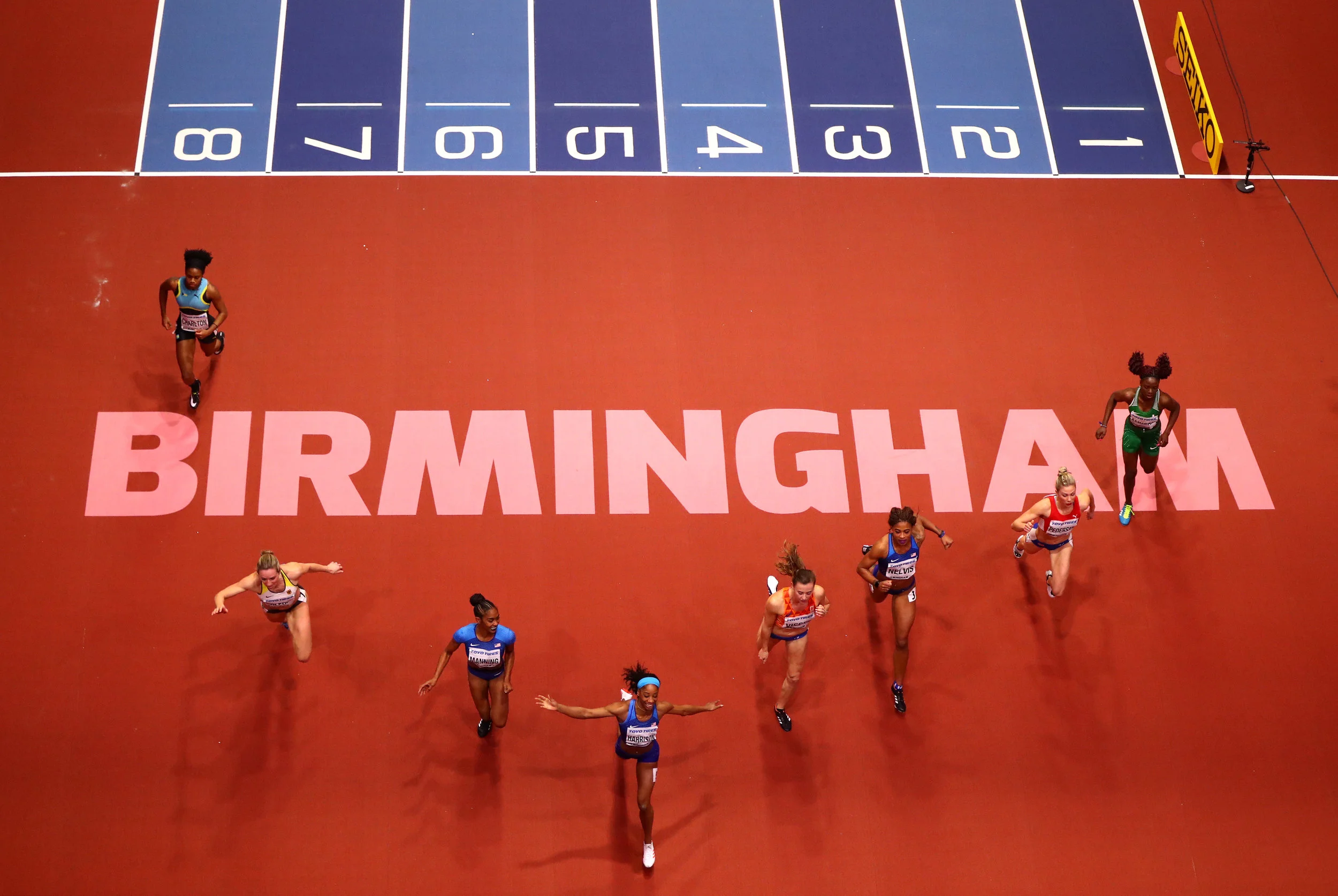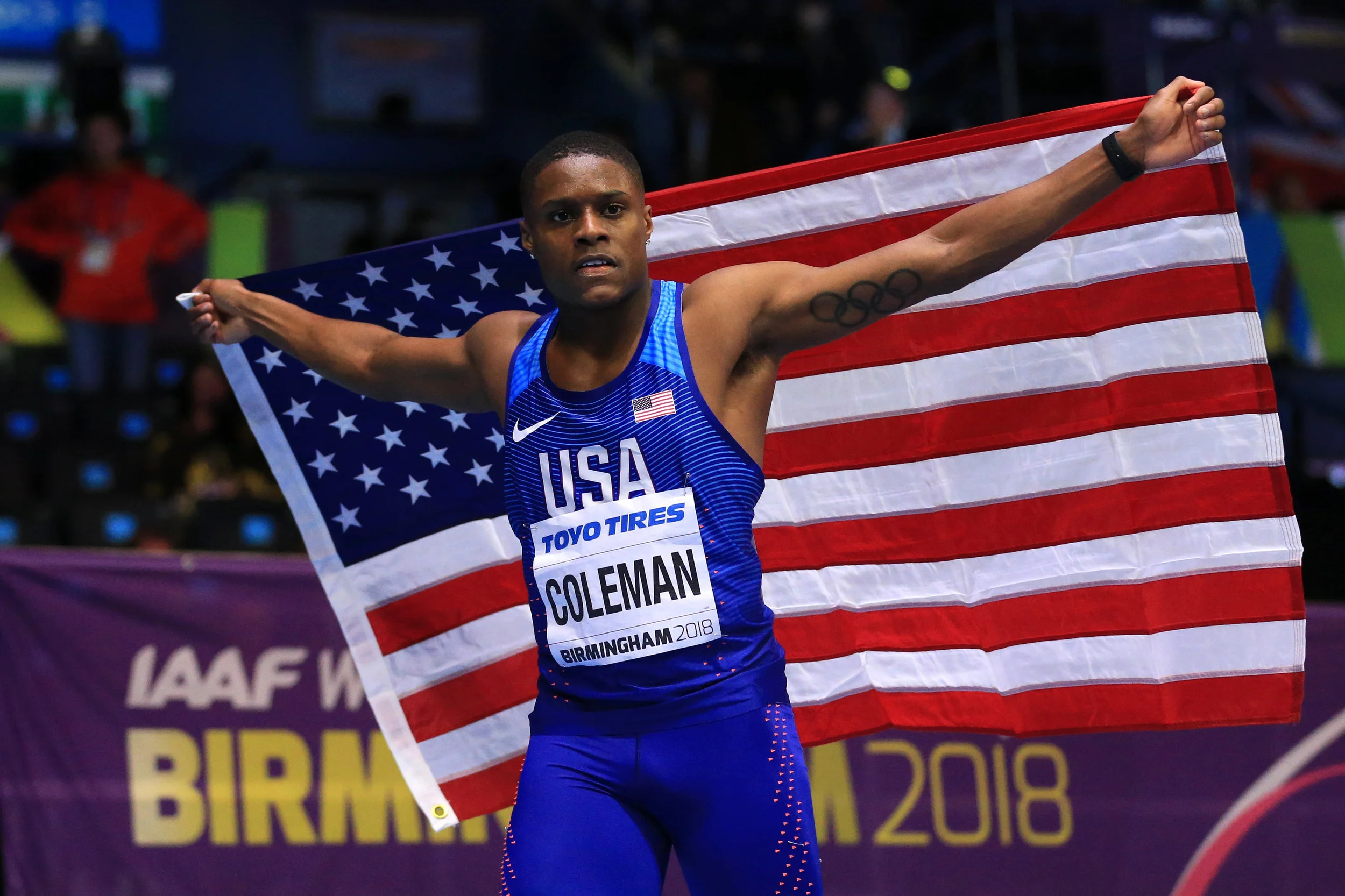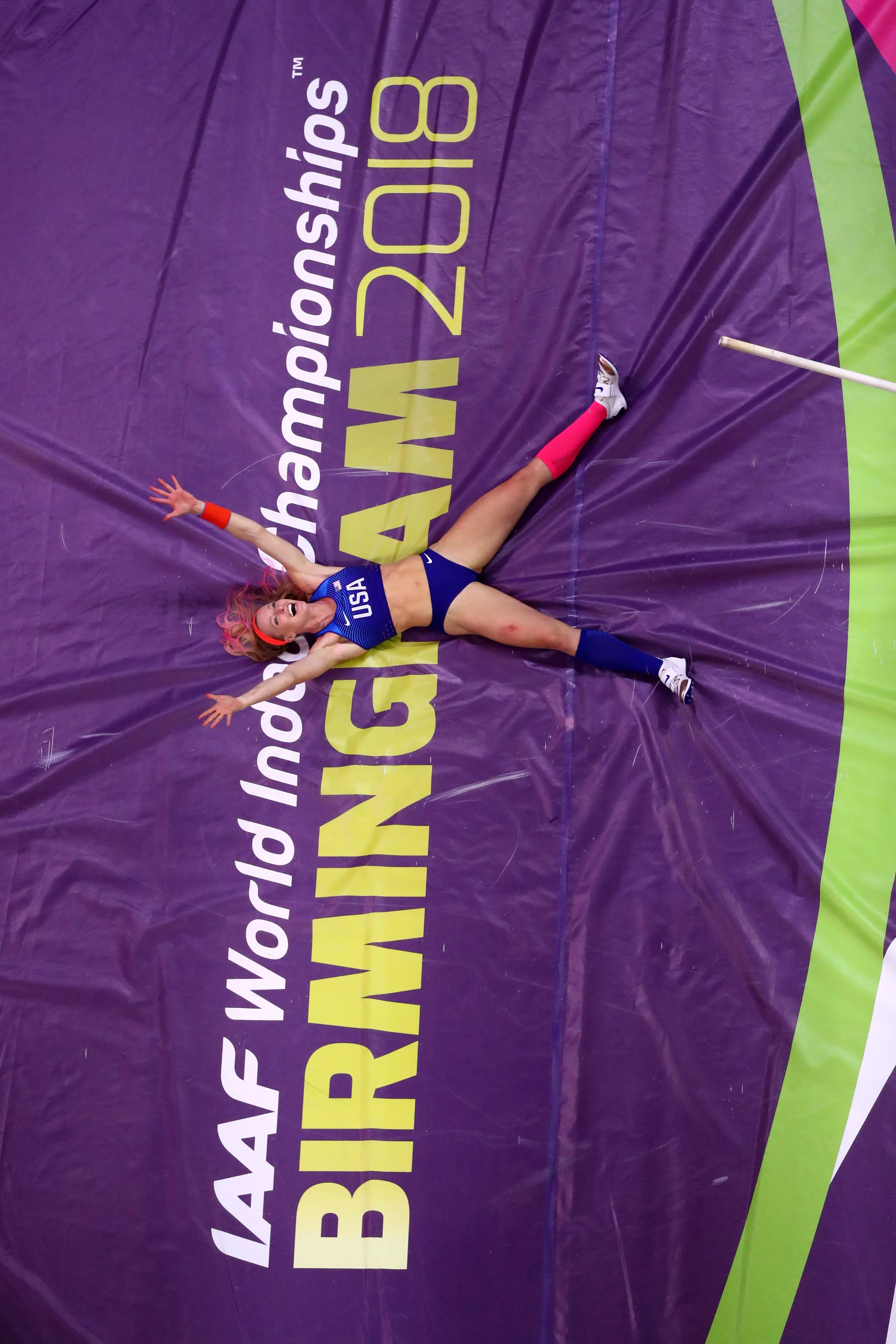BIRMINGHAM, England — Predictably, the American sprinter Christian Coleman is already being hailed as the next this, the next that, already being asked if he can run 100 meters faster than 9.58 seconds.
What is it about track and field, this almost-desperate need -- in some if not many quarters -- to anoint someone as savior?
No one is savior. No one needs to be the almighty. It’s an unfair ask. Who, alone, carries a sport in baseball, basketball, football, hockey or soccer? Why, then, track and field?
Christian Coleman after winning the 60-meter world indoor championship // Stephen Pond/Getty Images for IAAF
Coleman, just 21, is an outrageous talent. A few weeks ago, at the U.S. nationals, in Albuquerque, he broke the world indoor record for 60 meters, running 6.34 seconds. On Saturday night, here at the 2018 world indoor championships, he went a championship-record 6.37, five ticks faster than Mo Greene's 6.42 from 1999.
China's Bingtian Su took second Saturday evening, in 6.42. American Ronnie Baker got third, in 6.44.
It is part of the human condition to tell stories. Like no other sport on Planet Earth, track and field is rich with stories. Almost everyone everywhere runs, jumps and throws. It is that elemental. It's also why the sport is eternally more than Coleman. Or anyone.
Here at these championships, consider:
-- In the men's long jump, a 19-year-old Cuban, Juan Miguel Echevarria soared 8.46 meters, or 27 feet 9-1/4 inches, for the win, the longest jump indoors in eight years. The winner at the 2017 world championships at Olympic Stadium in London, South Africa’s Luvo Manyonga, took silver, in 8.44, 27-8 1/4. Third place: American Marquis Dendy, the 2016 world indoor champ, in 8.42, 27-7 1/2.
Four centimeters separated three guys. Clearly, the men's long jump is poised for a new turn under the spotlight. And how is it that Cuba keeps producing such great athletes?
-- In the women's 60 meters, Murielle Ahoure of Ivory Coast ran 6.97, that nation's first-ever global gold medal. The last time any woman ran faster: 1999.
Marie-Josee Ta Lou, also of Ivory Coast, took second, in a lifetime-best 7.05.
This was the first time one country had gone 1-2 -- say again, Ivory Coast -- in the women’s 60 since Americans Me’Lisa Barber and Lauryn Williams took good and silver in 2006.
Ahoure said, “This past year has been so difficult with my father,” who died of cancer. “I knew he was watching from up there. I was talking to him before the race, saying, ‘Please, dad, help me in the race.’ I couldn’t get a gold medal when he was alive. I have so much pent-up emotion now.”
-- Women's shot put: your winner, Anita Marton, Hungary's first world indoor gold.
-- The American pole vaulter Sandi Morris had won silver at the 2016 Portland world indoors, at the 2016 Rio Olympics and again at London 2017. On Saturday, she won with a championship record and indoor personal best, 4.95m, or 16-2 3/4. She cleared 4.95 on a third try, and said, "Honestly, I am so proud of this moment and so proud of myself because to make the height that high on a third attempt under pressure is incredible. It was the competition of my life."
Sandi Morris celebrating a big clearance in the pole vault // Michael Steele/Getty Images for IAAF
-- Oscar Husillos ran a championship-record 44.92 to (seemingly) win the men's 400. His rooting section included people wearing the following costumes, who threw him a Spanish flag: banana, cow and (sidekick to Batman) Robin. Then -- yet another instance of track and field cannibalizing itself -- he and runner-up Luguelin Santos of the Dominican Republic were caught up in a wave of ticky-tack lane infractions that have swept over these championships, and disqualified. The declared winner: the Czech Pavel Maslak, who crossed the line third, in 45.47. As Maslak said, "They would have beaten me, anyway, so even if it is gold, it will have a bronze flavor for me."
-- American Will Claye, the 2012 world Indoor gold medalist and three-time Olympic medalist, won the triple jump, going 17.43m, or 57-2 1/4. Afterward, he said he'd had only "one practice session this whole season," so, OK. He also said, "I'm releasing an album so I may take the outdoor season off and just focus on music." So, yeah.
-- For the first time since the non-championship race at the 1985 World indoor Games, no American women made the 60-meter final. Meanwhile, in the women's 60-meter hurdles, Americans went 1-2-4, Keni Harrison winning in a championship-record 7.70, Christina Manning second in 7.79, Sharika Nelvis fourth in 7.84. Holland's Nadine Visser took third in 7.84. "Emotionally I am at a loss [for] words," Harrison said, adding, "I have been dreaming about this moment."
Keni Harrison leads the almost-perfect chevron in the 60-meter hurdles // Michael Steele/Getty Images for IAAF)
-- Kim Collins of St. Kitts and Nevis won the world 100 title in Paris in 2003. He ran in the same Saturday morning 60 heat as Coleman, crossing in 6.77, just six-hundredths back of Coleman's 6.71. That was it for Collins, who had made his point and did not start in the evening semifinals. He is 41 years old:
"This is it. I can't do it anymore. The body isn't able to do what it is supposed to do. But I am going out in peace -- no low notes, no high notes. There will be no comebacks."
He also said, "I keep telling the youngsters that I am old enough to be their father" -- in Coleman's case, for instance, literally true -- "and that they should show me respect."
At last year’s London worlds, Coleman’s breakout performance, he ran 9.94, second to Justin Gatlin's 9.92 in the 100. Third: Usain Bolt, 9.95.
Here, Coleman said, “I don’t want to be the next Usain Bolt. I want to be Christian Coleman, and a few years from now, maybe people will say, ‘Who will be the next Christian Coleman?’ “
One of the reasons serious track geeks are so interested in Coleman’s career arc is that race in London came after Coleman had run an entire NCAA season, at Tennessee. Translation: Coleman had already run dozens of races and still beat Bolt.
Now Coleman is a professional. He can, and will, pick his race schedule.
This is perhaps why, though his best 100 is a 9.82, run last June in Eugene, Coleman is getting questions about breaking Bolt’s 9.58. This, though, would be like asking Josh Rosen or Sam Darnold when they expect to win a sixth Super Bowl and surpass Tom Brady. Nobody is doing that at this week's NFL combine. Why? Because it's ridiculous. Why, then, Coleman and Bolt?
“That’s something that’s a huge reach,” Coleman said of 9.58, adding a little bit later, “I’m not necessarily shooting for the world record. I just want to compete and get better.”
There's no 2018 outdoor championship. That means there's no ready vehicle for the bigger world out there to see more of Coleman or, for that matter, anyone. There is the Diamond League. And a new event in July, the eight-nation World Cup, back at Olympic Stadium in London.
"I have a good chance to lead the sport in the post-Bolt era," Coleman said late Saturday. "But like I've told so many others, loads of guys have the talent."
He also said, "When I've put things together during the meets special things have happened but I'm excited for the outdoor season. I won't put a limit on myself. We'll just see what happens."




